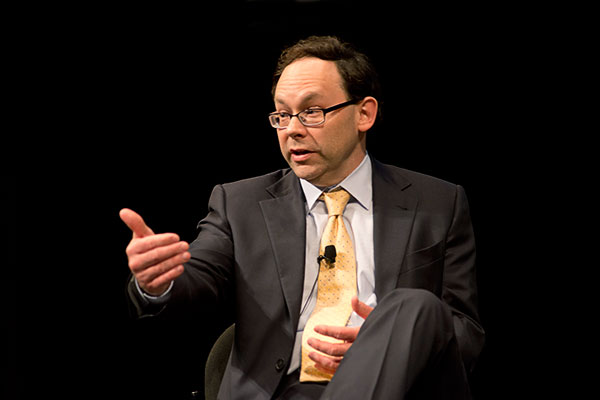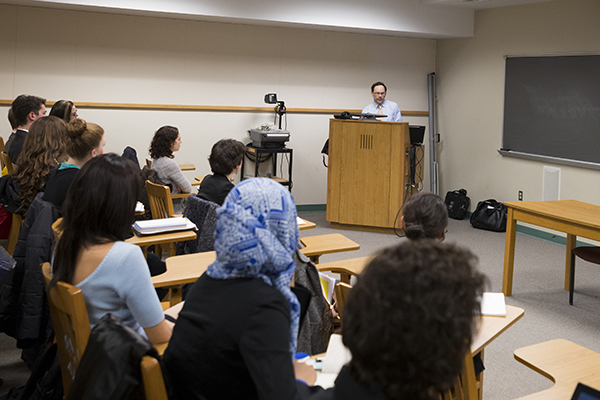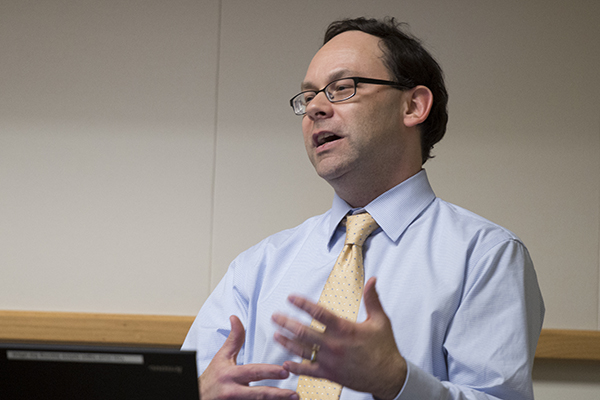


Global Agenda
Pew Research Center's Wike discusses public opinion around the world
4:32 p.m., March 6, 2014--Political science and international relations professors and students at the University of Delaware are familiar with the importance of data, trends and research.
One man behind this kind of information, Richard Wike, director of the Global Attitudes Project at the Pew Research Center, spoke about a variety of global topics and what his results mean to a Global Agenda speaker series audience in Mitchell Hall on Wednesday, March 5.
People Stories
'Resilience Engineering'
Reviresco June run
The Pew project has interviewed more than 330,000 people with the help of local research organizations, with a new report the project is working on conducted in 45 nations and translated into 75 different languages.
“We adjust research to try to figure out what to explore and understand, what people are thinking about, and important international issues going on around the world,” said Wike.
Interpreting the data
Wike’s presentation, “Global Public Opinion,” outlined four main areas of research conducted in the project including the rise, fall and persistence of anti-Americanism; the rise of China; the rejection of extremism among Muslim publics; and the desire for as well as the frustration with democracy.
Equipped with the charts, tables and graphics designed by the Pew Research Center, Wike was able to speak to the audience while displaying data the research team collected.
One of Wike’s findings included a juxtaposition between a large number of negative views concerning the spread of American ideas and customs and a fondness for American pop culture.
A recent trend finds a clear shift in terms of which nation people see as the world’s leading economic power, now favoring China over the U.S., he said, adding the way the world views America as a super-power has shifted.
Findings concerning extremist views and a desire for democracy show that the more people experience something -- whether it is through anti-government organizations or changing political powers -- the less likely they are to support it later.
An example of this was depicted in a chart displaying data that analyzed Eastern European views addressing the question, “Are people worse off now than when they were under communism?” Respondents in countries including Hungary, Ukraine and Bulgaria had high levels of displeasure toward the current government, well over 50 percent.
“We collect information on new elements of discovery,” said Wike.
There is common story across the four topics discussed by Wike. Different means of asking questions and addressing topics provides narratives as to how people want to organize themselves domestically and politically, along with how they see the world.
Although Wike cannot make policy recommendations, he said, “We put the data out there and we try to do research that speaks to debates. We help other people take research and data and make actions of the information.”
Global Agenda: The class
Concerning America, Wike said he found that young people around the world have a more favorable opinion of the U.S. than their older counterparts in the various populations due to the fact that they tend to have a more internationalist point of view and a more open and positive outlook on the world.
Students taking the Global Agenda class POSC/COMM 444, to which Wike spoke prior to the evening lecture, were able to identify with that mindset.
“I think as a student I passionately and optimistically want to change the world. Seeing his work makes me want to work harder and gives me validation that the course of study I chose is the right one for me,” said Nikita Mutter, a junior majoring in English and public policy.
The Global Attitudes Project reaches audiences ranging from the media who help broadcast information to the greater public, policy makers to help make informed decisions, think tanks, academia and students. The Pew Research Center is a nonpartisan organization not subsidized by the government but rather largely privately funded.
“Their nonpartisanship and staying away from sponsored research keeps them at the top of the totem pole,” said Greg Doolittle, a senior international relations major. “They are not going to sugarcoat results or use an algorithm to skew the results.”
Students taking the Global Agenda class have the chance to speak with visiting speakers in class before a reception and dinner is held at 44 Kent Way. This gives students the chance to have conversations directly with the speakers and find out more about their personal stories, rather than only the materials they present to the audience later in the evening.
“This class brings [the experts] in,” said Melissa Verlaque, a junior majoring in international relations and history. “We cite these sources and now we get to meet the people behind the research.”
The Global Agenda class is taught by Julio Carrión, director of the Center for Global and Area Studies and professor of political science and international relations, and director and moderator for Global Agenda.
Global Agenda continues, with a schedule change
The Global Agenda series, whose theme this year is “Global Demands, Regional Responses,” continues on Wednesday, March 12, with speaker Danya Greenfield, director of the Rafik Hariri Center for the Middle East.
A talk by Peter Westmacott, British ambassador to the U.S., previously scheduled for Wednesday, March 26, has been moved to Tuesday, March 25.
All the talks begin at 7:30 p.m. in Mitchell Hall and are free and open to the public.
Global Agenda is presented by the Center for Global and Area Studies and sponsored by the Institute for Global Studies, the Center for Political Communication, the Department of Communication and the Department of Political Science and International Relations.
Article by Elizabeth Adams
Photos by Duane Perry and Kathy F. Atkinson










